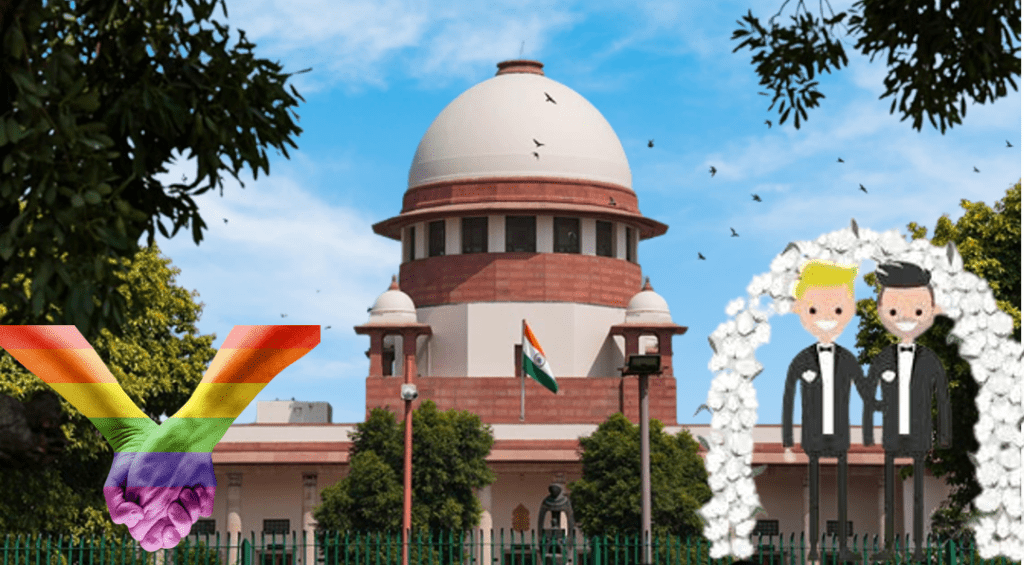
The 104-year old organisation of Muslim scholars in India — the Jamiat Ulama-i-Hind petitioned the Supreme Court against same-sex marriage. The center has also opposed a series of Supreme Court appeals to legalize same-sex marriage, saying it upsets the delicate balance between personal rights and accepted social values. Several other religious groups also protested, arguing that the institution of marriage could only exist between Opposite sexes.
Jamiat Ulama-i- Hind had told the Apex Court that as a legal institution, marriage between the
opposite sexes has been central to the legal regime of India.
The application filed on Friday through advocate MR Shamshad said, “The concept of same-sex
marriage will attack the family system. Among Muslims, marriage is a sacred contract resulting in the union of a biological man and a biological woman. Invoking the principle of constitutional morality to justify same-sex marriage on the grounds that the practice is legal in some parts of the world can be very damaging to social order in other parts of the world,” said Jamiat Ulama-I-Hind in his appeal…to the Supreme Court.
On March 13, the Supreme Court referred motions to legalize same-sex marriages to a five-member constitutional court, saying it was a “very seminal issue.”
The bench, headed by Chief Judge D.Y. Chandrachud said the submissions of the issue involve an interplay between constitutional rights on the one hand and special laws, including the special marriage act , on the other.
After the Supreme Court decriminalized homosexuality in 2018, petitions to the Supreme Court by members or organizations supporting the rights of the LGBTQ community argued that denying legal recognition of same-sex marriage violates fundamental rights.
In a series of petitions, the Supreme Court was asked to interpret the Hindu Marriage Act, the
Special Marriage Act, the Foreign Marriage Act and other laws, including the Citizenship Act and the Transgender Rights Protection Act, in order to govern relationships between people of the ensure same sex.
In his petition, Jamiat said: “The nature of the prayers in this petition are totally at odds with the established understanding of the concept of marriage in all personal rights – between a biological man and a biological woman – and are therefore intended to collect the central point , i.e. the structure of the family nucleus that prevails in the legal order of the private car.
The concept of marriage between two different sexes is in a way a fundamental feature of the
concept of marriage itself, which gives a set of rights (maintenance, inheritance, guardianship,
guardianship).
“Through these petitions, the applicants seek to undermine the concept of marriage, a stable
institution, by introducing a free system by introducing the concept of same-sex marriage,” the
appeal said. Jamiat argued that for Muslims marriage is a socio-religious institution between a
biological man and a biological woman and any other interpretation of marriage leads to considering as infidels those who claim to be married in this category.
Tracing the LGBTQI (l for Intersex) movement in the West, the Muslim organization said, “Since the atheistic worldview has had a decisive influence on the current shift in ideas about sexual morality, no space in the religious community can be regulated by the personal rights of communities.”
In a historic judgement on Sept. 6, 2018 ruling, the Supreme Court decriminalized consensual samesex sex between adults after years of activism.
In an affidavit filed with the Court of Appeal, the Government objected to the applications, arguing that despite the decriminalization of Section 377 of India’s Penal Code, the applicants could not seek recognition of the fundamental right to same-sex marriage under the country’s laws.
One of the previous petitions concerned the lack of a legal framework that would allow members of the LGBTQ+ community to marry anyone of their choice. According to a previous petition, the couple tried to uphold the basic rights of LGBTQ+ people to marry whoever they wanted and said it should be “free from legal contempt and a popular majority”. Furthermore, the applicants reaffirmed their fundamental right to marry and asked this court for appropriate guidance to enable them to do so.
Written by -Anushka yadav student of the ba.llb 2nd semester at Rnb global University bikaner, Rajasthan




0 Comments